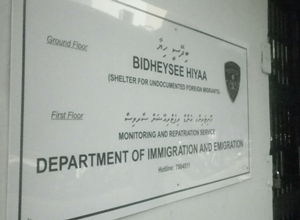The department of immigration has deported or repatriated 7,962 undocumented foreign workers so far this year under a voluntary departure programme, Minister of Defence Colonel (Retired) Mohamed Nazim has revealed.
Speaking at a press conference yesterday, Nazim claimed that the benefit of the deportations to the domestic economy was worth US$24 million a year.
“122 companies and private parties have been fined for hiring foreigners illegally and they have been prohibited from bringing in further [foreign workers],” he added.
Additionally, 21 places were raided in an operation to deport illegal migrant workers, he continued, which took place in Addu City, Laamu Atoll, Kaafu Atoll, and Alif Alif Atoll.
A fine of MVR50,000 (US$3,242) is specified in the law for hiring illegal migrant workers and deported foreigners are not allowed to return to the Maldives for ten years.
The immigration department deported 6,400 undocumented workers between January and July this year.
On April 24, Nazim announced a special operation to deport undocumented workers, promising that “the whole of Malé will be cleaned [of migrant workers]” within three weeks.
In December 2012, former President Dr Mohamed Waheed transferred the immigration department from the Ministry of Home Affairs to the Ministry of Defence and National Security.
Of the 7,962 deported workers, Nazim noted that 6,590 voluntarily requested repatriation, 69 left due to poor health, and 890 were deported for violations of the law.
A further 407 workers were deported due to various problems, he added.
Census results and human trafficking
Asked if the preliminary results of the national census conducted in September – which found the expatriate population to be 58,683 – were accurate, Nazim said the figure did not match the government’s official records.
Nazim suggested that census takers were unable to gather accurate information due to either lack of cooperation from expatriates or failure to locate foreign workers.
“Looking at our total statistics, our records show that there are 120,000 foreigners,” he revealed, adding that the estimate for illegal or undocumented workers was 30,000.
Some members of the public were hiding undocumented workers, he continued, urging the public to work with the government to tackle the issue.
In a recent visit to Raa atoll, Nazim said island councils in three islands informed him that there were about 150 undocumented workers hidden from the authorities by their employees.
“So this can be done if councils, islanders, and the government work together to deport foreigners,” he said.
Nazim also revealed that MVR181 million (US$11 million) had been collected as work visa fees by the end of October, MVR198 million (US$12.8 million ) as security deposits, and MVR30 million (US$1.9 million) was given out for deposit refunds.
A secondary passport verification system was meanwhile established at the Ibrahim Nasir International Airport (INIA) and the foreign employment section of the immigration system with the help of the International Organisation for Migration.
In addition to the repatriated or deported foreign workers, Nazim said 1,172 individuals were denied entry to the country – including 82 individuals with invalid passports, 503 individuals without employment approval, and 582 individuals turned away for other reasons.
While 3,102 individuals were granted business visas, Nazim said 770 individuals were granted special visas.
A MoU has been signed between the immigration department and National Centre for Information Technology (NCIT) to strengthen the expatriate online system.
Nazim also said efforts were underway to locate expatriates involved in human trafficking who were based in the capital Malé, including Indians, Sri Lankans, and Bangladeshis.
However, attempts to use the Maldives as a transit point or “gateway” for human trafficking – including sending foreign fighters to Syria – have proven unsuccessful due to the new passport verification system, he said.
“However, individuals traveling to the Maldives on fake or fraud visas were stopped and sent back,” he said.
In four cases of human trafficking investigated this year, Nazim said five victims were identified and 77 staff were trained to investigate such cases.
In June this year, the Maldives was removed the US State Department Tier 2 watch list for human trafficking and avoided relegation to Tier 3 along with the accompanying sanctions.
The 2014 Trafficking in Persons (TIP) report noted that an unknown number of the approximately 200,000 expatriate workers in the country experienced forced labour.
Among the advice given in the report was the development of guidelines for public officials to “proactively identify” victims, noting that thousands of migrants have been deported recently without adequate screening for indications of trafficking.
